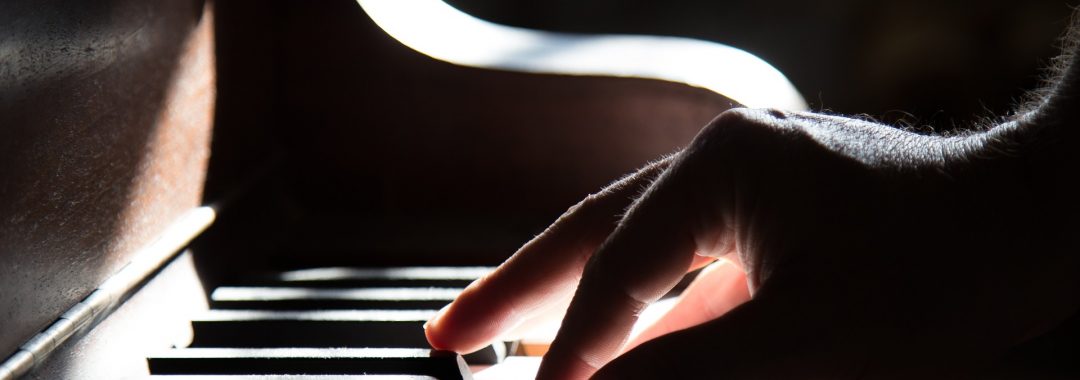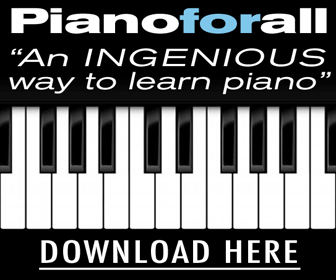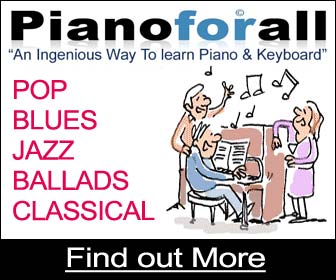“I'm a lyricist." “I’m a singer.” “I work with great players, so I don’t need to learn an instrument.” "I'm too old to learn an instrument." “I don’t have enough time to learn an instrument.”
 These are just a few of the reasons singer-songwriters and lyricists give for not playing an instrument. If you’re a songwriter who doesn’t play an instrument to accompany yourself, read on. My goal in this article is to convince you to learn an instrument, and give you eight reasons the piano is the best instrument for songwriting.
These are just a few of the reasons singer-songwriters and lyricists give for not playing an instrument. If you’re a songwriter who doesn’t play an instrument to accompany yourself, read on. My goal in this article is to convince you to learn an instrument, and give you eight reasons the piano is the best instrument for songwriting.
To be sure, there have been some great songwriters who didn’t play an instrument. In the heyday of Tin Pan Alley, much of the great American songbook was written by co-writing teams pairing lyricists with composers. Most often, the composer was a pianist.
Such notable songwriting partnerships include Lorenz Hart and Oscar Hammerstien II with Richard Rogers, Hal David and Burt Bacharach, and Bernie Taupin and Elton John. In fact, throughout history, most of the great composers - from Bach, Mozart and Beethoven to Bacharach, Billy Joel and Carole King - have been pianists.
Beginning with the birth of rock and roll in the 50’s and the growing popularity of the electric guitar, iconic guitar-playing singer/songwriters like Chuck Berry, the Everly Brothers, John Lennon and Paul McCartney and Robert Hunter and members of the Grateful Dead (primarily Jerry Garcia) changed all that.
As a result, many new, aspiring singer/songwriters learned and wrote songs on the guitar.
 And with good reason. The utility of the guitar as a tool for songwriters is undeniable. The guitar is versatile, light and portable. Guitarists can play both chords and melody, set the groove as part of the ‘rhythm section and thanks to amplification, take center stage for lead solos.
And with good reason. The utility of the guitar as a tool for songwriters is undeniable. The guitar is versatile, light and portable. Guitarists can play both chords and melody, set the groove as part of the ‘rhythm section and thanks to amplification, take center stage for lead solos.
The guitar’s portability allows you to move around on stage and play to the crowd. (While it’s harder to do that with a piano, it’s not impossible, as anyone who saw Jerry Lee Lewis perform in his heyday can attest.) You can easily take a guitar to co-writing sessions, to gigs in venues that aren’t likely to have a piano, or anywhere, even on vacation. Most importantly, it’s easy for singer/songwriters to accompany themselves on a guitar without a backing band.
Learning the guitar is not without some difficulties, however. Many beginning guitar players quit before they build up calloused fingertips. And understanding the relationships between notes and frets has caused a fair share of confusion.
The guitar is a fine instrument, and I’m not knocking it, either as a primary instrument or as a songwriting tool. There isn’t any style of music that can’t be written on it. And I recommend it for all the above reasons, difficulties, notwithstanding.
But for my money, the piano is a better choice. The piano is the greatest instrument ever, hands down, and that makes it the best all purpose instrument for songwriting. Even if you already play the guitar or another instrument, learning the piano will improve your songwriting. Here are eight reasons why the piano is the best instrument for songwriting.

Eight Reasons Why the Piano is the Best Instrument for Songwriting.
1. The piano opens up worlds of creative possibilities.
While technical limitations of fingering, note range and extent of polyphony affect all instruments to varying degrees, the piano may be the least affected. For example, it is much easier to create a sense of movement in an evolving melody on the piano than, say, a guitar, because it is simply technically easier to perform the movement up (or down) the scale on the piano. This also allows the pianist to compose melodies that are more dynamic in range, and therefore inherently more interesting.
Actually hearing your melody in the context of a chord can help you make new and more interesting choices. The note middle ‘C’ takes on an entirely different quality if it is sung over a C chord than if it is sung over an A minor chord or over a G chord.
2. You can actually start playing the piano relatively quickly.
Instruments like the violin and trumpet are notoriously difficult to learn, let alone master. While the piano is a difficult instrument to master, compared to many other instruments, piano is relatively easy. Even beginning pianists can get a reasonable sound just playing simple chords, often playing tunes after only a lesson or two!
I’m not saying that the piano is an easy instrument, but learning piano doesn’t have to be hard. Fortunately, there’s now a course that has been designed to take absolute beginners to an intermediate level faster than any other method. And that can take your songwriting to the next level.
To learn how, check out Piano for All
3. You can learn music theory more easily on piano.
The layout of the piano keyboard is intuitive, which makes it really easy to understand. The further right you go on the keyboard, the higher the note, and the further left you go, the lower the note. This makes piano the perfect tool for learning music theory. It is why if you seriously study any instrument, at some point you will be encouraged to study a little bit of piano on the side. From Bach, Beethoven, Mozart and Chopin, to Porter, Bacharach and Billy Joel, the overwhelming majority of great composers play piano.
4. The piano is the most polyphonic instrument.
Voice, woodwind and brass instruments can only play one note at a time, which means that you need several musicians to make even the simplest songs sound complete. You can play chords on the harmonic, but you can’t sing while your’re playing.
On the bowed stringed instruments of the violin family it is practically impossible to play more than two notes at once. Ukuleles have four strings that can be played simultaneously, mandolins and banjos have four, five or (sometimes) six strings, and guitars have six, for a maximum of six notes at a time.
But you can play 10 notes at once on the piano and with judicious use of the piano’s sustain pedal you can play the entire 88 notes at the same time. By playing arpeggios (a chord played in a series of ascending or descending notes) and sustaining the notes, the piano can be used to play rich, full sounds continuously.
Xylophones, harps and accordions are polyphonic, but without the same deep richness of sound. All pale in comparison to the piano.
And once you can play a piano, you can also play a keyboard synthesizer or workstation, which opens even greater dimensions of polyphonic sound.
5. You can play chords and melodies simultaneously on the piano.
While instruments in the guitar and lute families can also play both chords and melodies, they have limitations that the piano does not. On the piano, you can play chords with the left hand while simultaneously playing a melody anywhere with the right hand - or vice versa.
In addition, a piano is one of the few instruments that can play two melodies at the same time. You can create simple two and three note musical hooks (think dah-dah-dah-dum) or intricate, complex melodies with either hand, going in the same (parallel) or opposite (contrapuntal) directions.
6. You can lay down a groove and a bass line on the piano.
The sound of the piano comes from strings being struck by hammers, which makes it a percussive stringed instrument. You can play rhythmic chords with your right hand while “walking the bass” with your left. In stride piano songs like Scott Joplin’s ‘The Entertainer’, the left hand alternates between bass and chords, while the right plays the melody.
But you don’t have to play anything that complex. Playing simple pop rhythms, and adding a simple bass line using whole or half notes on the first and third beats to stay in time is sometimes all you need.
7. You can use the piano to accompany yourself.
As noted above, you can play chords, keep the beat, add interesting bass lines, and intersperse musical hooks and longer melodic solo passages so that you can hear and present the song in a fuller context.
To learn how, try Piano for All
8. Piano makes your songs more expressive.
The best expression of our songs occurs the closer we can come to emulating a full band. Piano is the one instrument that allows the songwriter to be the entire band, The better your ability to express your songs, they more likely you are to move your listeners.
What could be better than playing your song on the best instrument ever?
It will fill your life with joy and satisfaction…
It will improve your songwriting...
To learn how, try Piano for All






